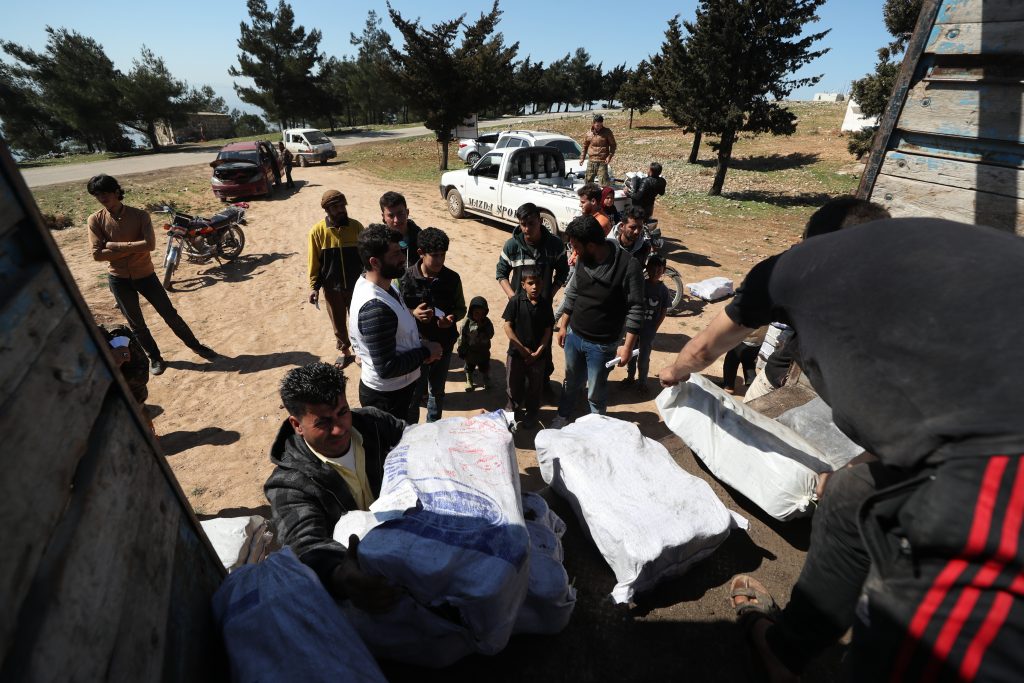The military offensive carried out by the Government of Syria and its allies in northwest Syria has led to almost a million people in the Idlib region becoming displaced in the space of just four months. People have had to flee from their homes or from the camps they were already displaced in, to escape the daily shelling, aerial bombing, and ground offensives.
On 5 March 2020, the governments of Turkey and Russia agreed on a ceasefire in Syria’s Idlib province. Though the intensity of the fighting and the movements of people have decreased over the past weeks, the situation of Syrians who have had to flee the fighting has not changed. Most of them still live in overcrowded spaces and in very unhygienic settings.
Biting cold adds to challenges – and death toll
Recently, displaced people in northwest Syria have also had to face winter cold, with temperatures sometimes reaching below zero degrees Celsius at night.
“The cold is just one other factor complicating an already incredibly difficult and dramatic situation,” explains Cristian Reynders, MSF field coordinator in northwest Syria. “Some people are so desperate that they’ve been using dangerous materials to heat their tent.”
A month ago, a family of four died of suffocation after using dangerous materials to warm up their tent, in an internally displaced people’s camp in the town of Kili, north of Idlib city. And at the beginning of March, a fire broke out in another camp in northern Idlib province, for the same reasons. This led to an influx of 12 burn patients at the Atmeh hospital run by MSF.
“We had already considerably scaled up our activities since the beginning of the offensive,” says Reynders. “But we felt like tackling this particular issue upfront was also extremely important.”

MSF distributing heating material, soap, clean water
Since the beginning of March 2020, we have been distributing more than 300 tons of heating materials to more than 22,000 people in 21 camps and settlements hosting families who have been displaced by the conflict. We have also distributed other essential items such as hygiene kits containing soap and mattresses to more than 17,000 people in 19 camps and settlements over the past months. Throughout the month of March, 2,000 additional kits of essential items will be distributed.
“Though we have already considerably scaled up our distributions, we have also increased our other activities in the camps,” Reynders says. “The recent ceasefire in northwest Syria doesn’t mean that living conditions in all these camps have improved or that people have returned back to their homes. On the contrary.”
“Not only do almost a million people still live in the cold today, many do so in very unsanitary conditions,” Reynders continues. “And sometimes they don’t even have access to basic things like drinkable water and health services if they get sick.”
Since last month, MSF has been ensuring the provision of safe water in more than 15 camps to approximately 40,000 internally displaced people. And since December 2019, our mobile clinic teams have continued providing services in various locations and received more than 17,000 people for medical consultations. Forty per cent of patients presented with upper respiratory tract infections and 13 per cent presented with lower respiratory tract infections.
Though the situation in northwest Syria has fallen out of the worldwide headlines in the past weeks, people’s daily struggle in Idlib is still very much a reality. We are trying our best to answer the needs, but they are much higher than our actual capacity to respond.
“Covering the medical needs of the displaced people in Idlib is challenging for multiple reasons, such as the insecure environment our teams work in and the limits of our own resources,” says Cristian Reynders. “But we have to continue helping people there, many of whom have lost everything and can now rely only on humanitarian assistance. We cannot just close our eyes on what is happening or get discouraged by the fact that much more still needs to be done to help the people here.”
Across northwest Syria, MSF teams provide maternal healthcare, general healthcare and treatment for non-communicable diseases (NCDs) through mobile clinics. They distribute relief items and improve water and sanitation systems. They also support regular vaccination activities in two vaccination centres and one hospital and through mobile clinic services.
Also in northwestern Syria, MSF runs a specialized burns unit that provides surgery, skin grafts, dressings, physiotherapy and psychological support. MSF provides distance-support provides support to primary and secondary healthcare in several hospitals and clinics around Idlib and Aleppo and has co-management partnerships with three hospitals.
MSF’s medical programs across Raqqa, Hasakeh and Aleppo governorates in northeastern Syria continue. MSF runs activities in Al-Raqqa, Kobane/Ain Al-Arab, Al-Hol camp, Washokani camp, and Tal Kochar/Yaroubiyah, and is supporting the local health authorities with COVID-19 outbreak preparedness.
To ensure independence from political pressures, MSF receives no government funding for its work in Syria.
-
Related:
- refugees and migrants
- Syria












